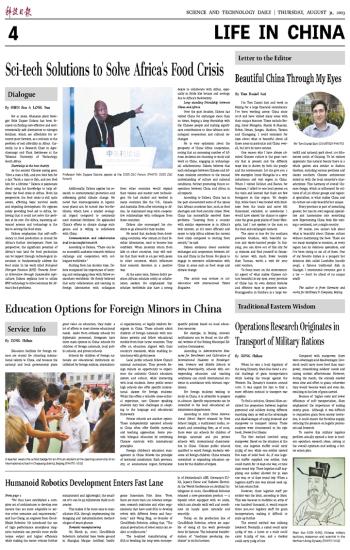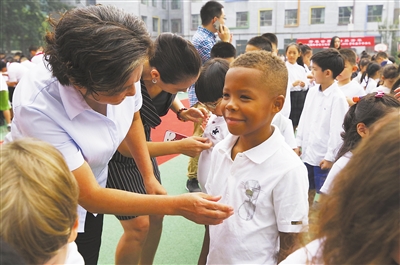
 |
| A teacher wears the school badge for an African student at the opening ceremony of an international school in Chaoyang district, Beijing. (PHOTO: VCG) |
Education facilities for foreign minors are crucial for attracting international talents to China, and because the national and local governments place great value on education, they make a lot of efforts to meet diverse educational needs. Aside from embassy schools for diplomatic personnel, foreigners have three main options in China: schools for children of foreign nationals, local public schools, and private schools.
Schools for children of foreign nationals are educational institutions established by foreign entities, international organizations, or legally resident foreigners in China. These schools admit children of foreign nationals with residence permits and follow educational models from their home countries. They offer an education aligned with their country's standards, while enabling interactions with global peers.
Local public schools follow China's national curriculum. They provide foreign minors an opportunity to experience the authentic China's education system and culture, while interacting with local students. Some public senior high schools also offer specific international classes for foreign students. While this offers a valuable cross-cultural experience, non-Chinese-speaking students may face challenges in adapting to the language and educational framework.
Private schools are another option. These independently operated schools in China often offer flexible curricula and teaching approaches. Some provide bilingual education by combining Chinese curricula with international principles.
Foreign children's education management in China follows the principle of territorial jurisdiction. Each province, city, or autonomous region formulates specific policies based on local education resources.
For example, in Beijing, relevant notifications can be found on the official website of the Beijing Municipal Education Commission.
According to Administrative Measures for Enrollment and Cultivation of International Students in Kindergartens, Primary and Middle Schools in Beijing Municipality, schools with corresponding education and teaching conditions can enroll international students in accordance with relevant regulations.
For foreign students wishing to study in China, it is advisable to prepare in advance. Specific requirements can be consulted to the local educational administration departments.
According to 2022 China International School Report released by New School Insight, a multilateral media, research and consulting firm, as of 2022, there were 142 schools for children of foreign nationals and 562 private schools with international characteristics in China. Chinese public schools qualified to enroll foreign students welcome all foreign children. China remains committed to expanding education options for the children of expats.







